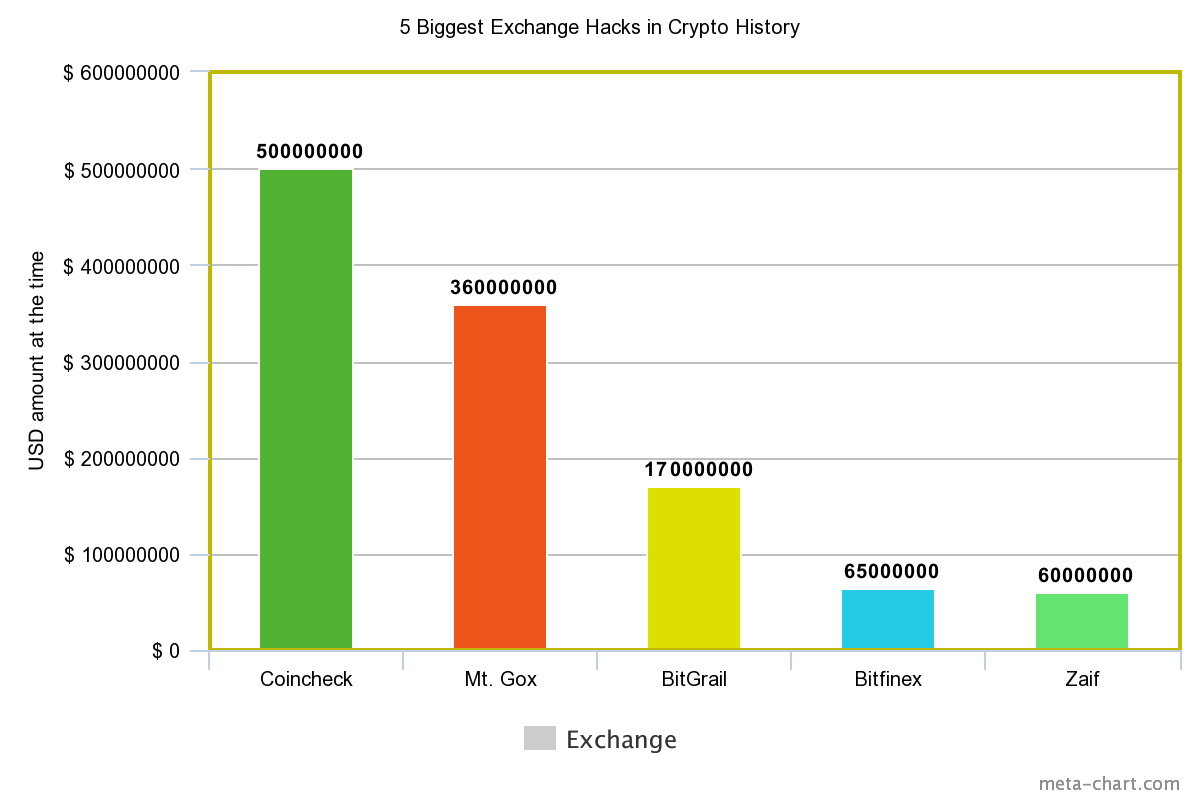The news of the Binance hack left the cryptocurrency industry rattled. Although, it turns out that a massive $40 million’s worth of BTC doesn’t even register this heist among the worst. Check out the five biggest exchange hacks in crypto history.
The 5 Biggest Exchange Hacks in Crypto

As you can see from the above image, the Binance hack comes in a measly sixth place. There’s no doubt that the world’s biggest cryptocurrency exchange will recover from its stinging loss.
The hacker only targeted Binance’s hot wallet which holds just 2 percent of all the exchange’s BTC. In fact, CEO Changpeng Zhao (CZ) is already chalking it up to a “lesson learned” (albeit an expensive one).
cons: 4 While it is a very expensive lesson for us, it is nevertheless a lesson. it was our responsibility to safe guard user funds.
We should own up it. We will learn and improve.
As always, thank you for your support!
— CZ Binance (@cz_binance) May 8, 2019
And, it could have been way worse–just ask Coincheck, the Japanese exchange that still takes first place in the biggest exchange hacks in crypto history.
1. Coincheck (Jan 2018)
According to cryptocurrency intelligence agency CipherTrace, 2018 eclipsed all other years as far as exchange hacks go, with Coincheck leading the way. To kickstart the year that would also be the longest bear market for the industry, Coincheck was hit by hackers stealing more than 500 million NEM cryptocurrency (around $530 million).
NEM stuck the blame firmly on the ‘relaxed security measures’ of Coincheck even though it was only its cryptocurrency XEM that was stolen. No hard fork was carried out and Coincheck, for now at least, retains the top place on the list.
2. Mt. Gox (Feb 2014)
Eclipsed in the dollar amount stolen, the Mt. Gox hack is still undoubtedly the most infamous exchange hack of all time. It’s still the largest Bitcoin heist, in fact, with an eye-watering 850,000 BTC snatched by hackers (around 6 percent of all available BTC at the time).
Up until the start of 2014, Mt. Gox handled some 70 percent of all the world’s BTC transactions. By February of that same year, it was declaring bankruptcy.
While some 200,000 of the stolen BTC was recovered, other users remain hopeful of recuperating their funds. A trustee Nobuaki Kobayashi is now in possession of over 141,000 BTC and 142,000 BCH and is supposed to return them to their rightful owners. The question is, when?
3. BitGrail (Feb 2018)
Shady as they come Italian exchange BitGrail lost some 17 million Nano tokens worth around $170 million in the third biggest exchange hack in crypto history.
While the hack was revealed in 2018, the plot around the story soon began to thicken as users became aware that the exchange had been targeted previously and was insolvent for a number of months prior.
Moreover, its owner Francesco Firano tried to place the blame on Nano, requesting a hard fork to recuperate the funds. This was denied and the blame was laid squarely on BitGrail. In 2019, a court ordered Firano to return the missing funds to BitGrail customers.
4. Bitfinex (Aug 2016)
Controversy over Tether and one of the largest ever exchange hacks in crypto history, it’s a miracle that Bitfinex is still standing. The hack happened in August 2016 when more than 120,000 bitcoins were stolen causing the value of BTC to plummet within hours of the attack.
Users were compensated, however, unlike in many other situations, but they were paid out in BFX tokens rather than BTC.
5. Zaif (Sept 2018)
Losing around $60 million in cryptocurrencies including Bitcoin, Bitcoin Cash, and MonaCoin, Zaif was the second major Japanese exchange to lose funds after Coincheck earlier in 2018. This lead to Japan’s FSA to carry out an investigation of the incident.
They later found out the much of the stolen funds were traded on exchanges including Binance and Huobi. Hackers did this by creating hundreds of accounts and depositing just 2 BTC in them all, thus not triggering Binance’s AML red flags.
Don’t Keep Your Funds on an Exchange
We’re watching history repeat itself time and again. Hackers already stole over $356 million from exchanges in Q1, 2019.
The Binance attack is just another in a never-ending security breach waiting to happen and the moral of the story is always the same. Don’t keep your funds on an exchange. If you do, you’re putting your cryptocurrency at risk.











